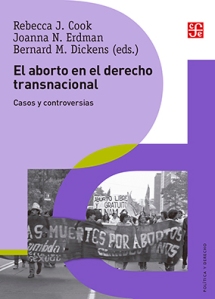Congratulations to Prof. Rebecca Cook, whose edited volume, FRONTIERS OF GENDER EQUALITY: TRANSNATIONAL LEGAL PERSPECTIVES, was published in May 2023 by the University of Pennsylvania Press. Professor Cook’s entire introduction to the book is now online, as well as abstracts of each chapter through the Table of Contents below:
Rebecca J. Cook, “Many Paths to Gender Equality,” in Frontiers of Gender Equality: Transnational Legal Perspectives (University of Pennsylvania Press, 2023). (publisher’s page). Introduction now online.
In “Many Paths to Gender Equality,” Rebecca Cook shows how a chorus of voices (25 authors) can introduce new and different discourses about the wrongs of gender discrimination and explain the multiple dimensions of gender equality. The wrongs of discrimination can best be understood from the perspective of the discriminated. The book illustrates how gender discrimination persists and grows in new and different contexts, how it continues to be normalized and camouflaged, and how it intersects with other axes of subordination, such as indigeneity, religion, and poverty, to create new forms of intersectional discrimination. With the benefit of hindsight, the book’s contributors reconstruct gender equalities in concrete situations, including women who were violated sexually and physically, and those needing access to necessary health care, including abortion.
Part I of the book focuses on “Understanding Gender Inequality and Equality.” Part II concerns “Advancing Gender Equality through Human Rights Treaties”. In Part III, entitled “Looking Back to Move Forward,” Chapters 16 through 20 use a “rewriting” process to “envision more fulsome gender equalities” for the future. The authors do so by analyzing and then rewriting historic decisions, documents, and even international policy guidance:
In Chapter 16, “Gender Equality in Health Care: Reenvisioning CEDAW General Recommendation 24,” Joanna N. Erdman and Mariana Prandini Assis observe how Article 12’s goal to eliminate all forms of discrimination against women in the field of health care was interpreted in 1999 through General Recommendation 24 (GR 24), within a particular gender equality paradigm of its era. After careful analysis, the authors propose text for a future general recommendation on gender equality in health care. Abstract of Chapter 16.
In Chapter 20, “Restoring Mai Mapingure’s Equal Citizenship,” Charles Ngwena and Rebecca Cook show how the Supreme Court of Zimbabwe’s 2014 decision in the case of Mai Mildred Mapingure, denied abortion after rape, exemplifies the systemic nature of status subordination that women seeking access to safe abortion may experience, especially in the health care and criminal and justice systems. After analyzing Mai Mapingure’s position as a “gendered citizen” under Zimbabwean constitutions, they rewrite the Supreme Court’s decision in ways that would restore her equal citizenship. Abstract of Chapter 20.
For abstracts of each chapter, see the Table of Contents below:
—————————————————————————————————————–
FRONTIERS OF GENDER EQUALITY:
TRANSNATIONAL LEGAL PERSPECTIVES
ed. Rebecca J. Cook
(University of Pennsylvania Press, 2023)
Foreword by Cecilia Medina Quiroga
Introduction: Many Paths to Gender Equality Full text online.
by Rebecca J. Cook .
Part I. UNDERSTANDING GENDER INEQUALITY AND EQUALITY
1. Faces of Gender Inequality
by Sophia Moreau. Abstract online.
2. Challenging the Frontiers of Gender Equality: Women at Work
by Sandra Fredman. Abstract online.
3. A Prioritarian Account of Gender Equality
by Shreya Atrey. Abstract online.
4. Queer Rights Talk: The Rhetoric of Equality Rights for LGBTQ+ Peoples
by Daniel Del Gobbo. Abstract online.
5. CEDAW Reservations and Contested Equality Claims
by Siobhán Mullally. Abstract online.
6. Gender Equality and the Sustainable Development Goals:
Discursive Practices in Uncertain Times
by Marieme S. Lo. Abstract online.
Part II. ADVANCING GENDER EQUALITY THROUGH HUMAN RIGHTS TREATIES
International Treaties
7. Fifty Years On: The Curious Case of Intersectional Discrimination
in the ICCPR, with a Postscript, by Shreya Atrey. Abstract online.
8. Like Birds of a Feather? ICESCR and Women’s Socioeconomic Equality
by Meghan Campbell. Abstract online.
9. Gender Equality Untethered? CEDAW’s Contribution to Intersectionality
by Loveday Hodson. Abstract online.
Regional Treaties
10. Gender Equality in the European Court of Human Rights
by Stéphanie Hennette Vauchez Abstract online
11. Gender Equality within the Framework of the European Social Charter
by Karin Lukas and Colm Ó Cinnéide. Abstract online.
12. Transformative Gender Equality in the Inter-American System of Human Rights
by Verónica Undurraga. Abstract online.
13. African Gender Equalities,
by Fareda Banda. Abstract online.
14. Advancing Gender Equality through the Arab Charter on Human Rights
by Mervat Rishmawi. Abstract online. Executive Summary in English.
Panel discussion held Oct 9, 2023.
Part III. LOOKING BACK TO MOVE FORWARD
15. Breathing Life into Equality: The Vishaka Case
by Naina Kapur. Abstract online.
16. Gender Equality in Health Care:
Reenvisioning CEDAW General Recommendation 24
by Joanna N. Erdman and Mariana Prandini Assis.
Portuguese translation of article. Abstract online in English.
17. Equality for Indigenous Women: McIvor v. Canada
by Cheryl Suzack. Abstract online.
18. Gender Equality and the Scope of Religious Freedom in S.A.S. v. France
by Ilias Trispiotis. Abstract online.
19. Institutional Dimensions of Gender Equality: The Maria da Penha Case
by Marta Rodriguez de Assis Machado and Mariana Mota Prado.
Portuguese translation. Abstract online in English.
20. Restoring Mai Mapingure’s Equal Citizenship
by Charles G. Ngwena and Rebecca J. Cook. Abstract online.
Conclusion. Taking Stock of Gender Equality
by Francisca Pou Giménez. Abstract online.
Table of Cases
Table of Legislation, Treaties, and Other Relevant Instruments
Notes
Index
Contributors
Acknowledgments
FRONTIERS OF GENDER EQUALITY: TRANSNATIONAL LEGAL PERSPECTIVES, Ed. Rebecca J. Cook, (University of Pennsylvania Press, 2023) Purchase options: North and South America, Rest of the Worl
_________________________________________________________________________________________
Contributed by: The International Reproductive and Sexual Health Law Program, reprohealth*law at utoronto.ca. See Program website for our Publications, Research resources, and Reprohealthlaw Commentaries Series. TO JOIN THE REPROHEALTHLAW BLOG: enter your email address in the upper right corner of this blog, then check your email to confirm the subscription.




 Posted by reprohealthlaw
Posted by reprohealthlaw 



